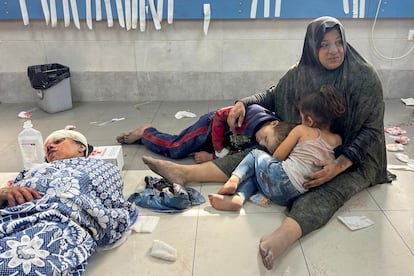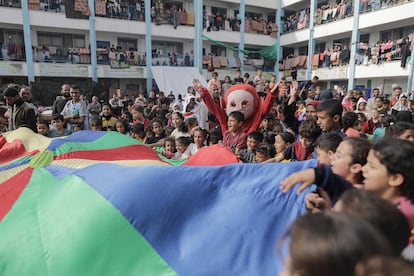UN reports allege murder, maiming and arbitrary detention of Palestinian children
The United Nations human rights rapporteur presses Israel to stop the abuse of minors in Gaza and the West Bank

Children lying injured in rubble and hospitals have become a symbol of the Israel-Hamas war in Gaza. However, minors in the Palestinian territories have endured systematic violence for decades. According to the UN Office for the Coordination of Humanitarian Affairs (OCHA), 1,434 Palestinian children have been killed between 2008 and August 31 of this year, with most deaths attributed to Israeli forces. The UN Office for Children and Armed Conflicts (CAAC) documented 1,679 cases of maimed minors between 2019 and 2022. Defense for Children International, citing UNICEF data, reported that 3,000 Palestinian children have been detained, interrogated, tried and imprisoned since 2000. A significant number of these minors (1,598 in the past decade) needed medical attention while under arrest, suggesting possible mistreatment.
At the United Nations General Assembly on October 24, Francesca Albanese, the UN Special Rapporteur on Human Rights in the Palestinian territories, presented a comprehensive report with data compiled from international organizations, local NGOs, complaint records and victim testimonies. Although she was not authorized by Israel to gather onsite information, Albanese’s report offers valuable insights into how the war has worsened the plight of children in Gaza and the West Bank. It also sheds light on the “structural violence” perpetrated against minors in these territories by Israel even before the war, violence that has systematically violated the basic human rights of Palestinians, including the right to life, dignity, education and housing. Albanese’s report urges the United Nations to demand that Israel “immediately cease all abusive practices on Palestinian children” and prioritize “the best interests of minors in the occupied Palestinian territories.”
Advanced unedited version of the report: https://t.co/LmMqGGXpjx
— Francesca Albanese, UN Special Rapporteur oPt (@FranceskAlbs) October 24, 2023
Albanese’s report is titled ‘Unchilded’ from birth and focuses extensively on Gaza. During the 16 years of the Israeli blockade and the six major military operations during that period (2008-2009, 2012, 2014, 2022, and 2023), Israeli attacks have resulted in the deaths of 4,269 Palestinians, including 1,025 children. “Advance warnings [of the bombings] have proven to be ineffective, as entire families have been killed in nighttime attacks,” stated the report, citing B’Tselem, an Israeli NGO. “There are no warnings during targeted attacks and innocent children become collateral damage... Palestinians in Gaza have been ‘imprisoned’ for 16 years and have few or no places to take refuge when the bombs fall.” Since the start of the war, 32 of the UNRWA’s [the UN agency for Palestinian refugees] facilities in Gaza have been bombed by Israel, killing at least 14 of its workers. “Even UNRWA schools are not safe,” states the report.
🔺Nearly 600,000 internally displaced people are sheltering in 150 @UNRWA facilities.
— UNRWA (@UNRWA) October 25, 2023
🔺Our shelters are FOUR times over their capacities - many people are sleeping in the streets as current facilities are overwhelmed.
🔺At least 40 @UNRWA installations have been impacted. pic.twitter.com/2nHuZBSN7T
The report has an extensive section about maimed children (1,679 between 2019 and 2022 in Gaza and the West Bank). Medical workers in Palestinian territories say one of the main causes is the Israeli military’s practice of “shoot to wound.” Israeli forces have also shifted away from “traditional methods” of dispersing demonstrations and now target the knees, femurs and vital organs of protestors. “In the 2018 Gaza protests, shots by Israeli forces caused permanent disability in many of the 940 children they wounded; 20 were maimed, blinded or suffered other permanent disabilities.” The UN commission investigating the Israeli response to these protests said the use of force was “unnecessary, disproportionate and therefore unlawful.” According to OCHA, 32,175 minors were injured in the occupied territories from 2008 through August 31, 2023.
Albanese’s report states that UN agencies, including the Committee on the Rights of the Child, and NGOs on the ground have reported incidents of “cruel, inhuman, and degrading treatment” during the detention of 13,000 minors since 2000. “Palestinian children can be arrested during law enforcement operations, but also at checkpoints, on the street, on their way to school, while farming their land or in the quiet of their homes,” stated the report. Hundreds of Palestinian children are held under Israeli military custody each year, and their main alleged crime is stone-throwing, which can carry a 20-year sentence. During detention, 77% do not have access to lawyers before being interrogated, according to Military Court Watch, a Palestinian NGO. According to the report, 60% are deported to Israel (which constitutes a war crime), effectively preventing family visits due to the difficulty of obtaining a permit to enter Israeli territory. “Parents are often not notified about the location of their children during arrests. This not only violates the Convention on the Rights of the Child but can also be considered a forced disappearance. Widespread attacks on civilian populations constitute crimes against humanity.”
Harsh detention conditions
In many instances, the conditions of detention are also illegal. Children are frequently held in solitary confinement, with windowless cells and 24-hour lighting. This prohibited practice has increased from an average of 12.5 days in 2022 to 16.5 days in 2023. “Isolating individuals profoundly affects young people during crucial periods of development. It poses serious risks like disability, psychological harm, and increased suicide or self-harm rates. It also hampers addressing root causes of disruptive or violent behavior in children, hindering reintegration efforts.”
The special rapporteur’s report also highlights how the Israeli occupation reinforces poverty and underdevelopment in the Palestinian territories, which has cost their economy $58 billion since 2000. This has produced a stubborn level of underdevelopment that pushed 2.1 million citizens, half of whom are minors, below the poverty line. According to OCHA, half a million Palestinian children live with food insecurity and insufficient access to good quality food. “This affects their mental, physical and behavioral health, their education and, consequently, their life opportunities.” Since the Israeli occupation started, 56,500 Palestinian homes have been destroyed, according to the Israeli Committee Against House Demolitions (ICHAD). Albanese’s report calls this a tool to drive out the Palestinians and a collective punishment of the children who make up half of the Palestinian population.

The right to education has been denied by school demolitions in the West Bank (11 since 2010) and severely limited classroom space in Gaza. Many UNRWA and public schools have two or three shifts a day. Since 2012, over 300 children and teachers have been detained on their way to school, while another 481 had their school supplies confiscated at Israeli checkpoints. Educational centers are frequently targeted, with 1,826 raids or bombings by Israeli forces over the last 12 years, according to the UN CAAC special representative. Classes are often suspended in Gaza during military operations.
The report by the special rapporteur also accuses Palestinian militias, including those involved in the October 7 massacres in Israel, of violating human rights. Albanese states that the Israeli occupation and the Gaza blockade does not justify the actions of Palestinian armed groups. The report further implies that their indiscriminate rocket attacks against Israeli civilians and children can be viewed as war crimes. However, the report concludes that Israel’s brutal reprisals on Gaza’s densely populated residential areas also cannot be justified.
Sign up for our weekly newsletter to get more English-language news coverage from EL PAÍS USA Edition
Tu suscripción se está usando en otro dispositivo
¿Quieres añadir otro usuario a tu suscripción?
Si continúas leyendo en este dispositivo, no se podrá leer en el otro.
FlechaTu suscripción se está usando en otro dispositivo y solo puedes acceder a EL PAÍS desde un dispositivo a la vez.
Si quieres compartir tu cuenta, cambia tu suscripción a la modalidad Premium, así podrás añadir otro usuario. Cada uno accederá con su propia cuenta de email, lo que os permitirá personalizar vuestra experiencia en EL PAÍS.
¿Tienes una suscripción de empresa? Accede aquí para contratar más cuentas.
En el caso de no saber quién está usando tu cuenta, te recomendamos cambiar tu contraseña aquí.
Si decides continuar compartiendo tu cuenta, este mensaje se mostrará en tu dispositivo y en el de la otra persona que está usando tu cuenta de forma indefinida, afectando a tu experiencia de lectura. Puedes consultar aquí los términos y condiciones de la suscripción digital.








































